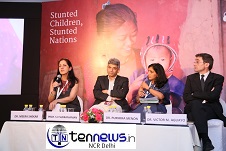Stunting is Holding Back the Development of South Asian Children and Nations

Stunting is Holding Back the Development of South Asian Children and Nations
New Delhi, 18 May 2016 – Stop Stunting in South Asia, a special issue of the international journal Maternal and Child Nutrition offers evidence that stunting is holding back the development of South Asian children and nations. The latest data indicate that 38 percent of South Asia’s children under five years of age – about 64 million children – have stunted growth due to chronic nutritional deprivation.
Stunting causes physical and neurocognitive damage that is most often irreversible. Stunted children have stunted bodies and brains and live stunted lives, hampering the development of entire societies. South Asia remains the epicenter of the global child stunting crisis, compromising the future of the whole region. Stop Stunting in South Asiafocuses on three major drivers of child stunting in the region: poor diets of children in the first two years of life; poor nutrition of women before and during pregnancy; and poor hygiene and sanitation practices in households and communities. The special issue features papers by global experts in maternal and child nutrition and the linkages between nutrition and sanitation. It also features papers by specialists based in South Asia who offer country-specific perspectives for Afghanistan, Bangladesh, Bhutan, India, Nepal, and Pakistan – countries that contribute substantially to the burden of stunting.
“South Asian nations must invest in large-scale programmes along with equity-focused social and economic policies for the prevention of stunting. These programmes must be based on evidence and give priority to the most vulnerable children and women” said Karin Hulshof, UNICEF Regional Director for South Asia.
Through their participation in the World Health Assembly, all South Asian countries have endorsed the global target to reduce the number of stunted children by 40 percent by 2025. “Countries in South Asia need to seize the opportunity of economic growth to invest in addressing child stunting at scale. These are investments that, if supported, can ‘lock in the potential’ for children and nations, with benefits that far exceed the cost” added Dr. Purnima Menon, Senior Research Fellow with IFPRI.
“Over the last two decades, the prevalence of stunting in South Asia declined from about 61 percent to about 38 percent. This is a remarkable achievement. The challenge ahead is to accelerate progress so that South Asia delivers its share of the global target to reduce child stunting. South Asian countries can afford to stop stunting and cannot afford the cost of inaction. The benefits of action will far exceed the cost” said Dr. Victor Aguayo, UNICEF Regional Nutrition Advisor for South Asia.
Studies estimate that every US$ 1 invested in nutrition generates US$18 in economic returns. Large declines in child stunting can be achieved with political will and evidence-based interventions. The need to invest fully to address stunting in South Asia is urgent.
Victor M. Aguayo (UNICEF) and Purnima Menon (IFPRI) are the guest editors of Stop Stunting in South Asia, a special issue of the international journal Maternal and Child Nutrition.
To download Stop Stunting in South Asia:
http://onlinelibrary.wiley.com/doi/10.1111/mcn.2016.12.issue-S1/issuetoc
For more information, photos and videos:www.stopstunting.org
# # #
Note to the Editors:
About UNICEF
UNICEF promotes the rights and wellbeing of every child, in everything we do. Together with our partners, we work in 190 countries and territories to translate this commitment into practical action, focusing special efforts on reaching the most vulnerable and excluded children, to the benefit of all children, everywhere. For more information about UNICEF and its work visit: www.unicef.org.
Follow UNICEF South Asia on Twitter and Facebook
For further information, please contact:
Jean-Jacques Simon, UNICEF South Asia: jsimon@unicef.org +977 9801030076
Vaishali Dassani, IFPRI South Asia : V.Dassani@cgiar.org +91 9810020635

